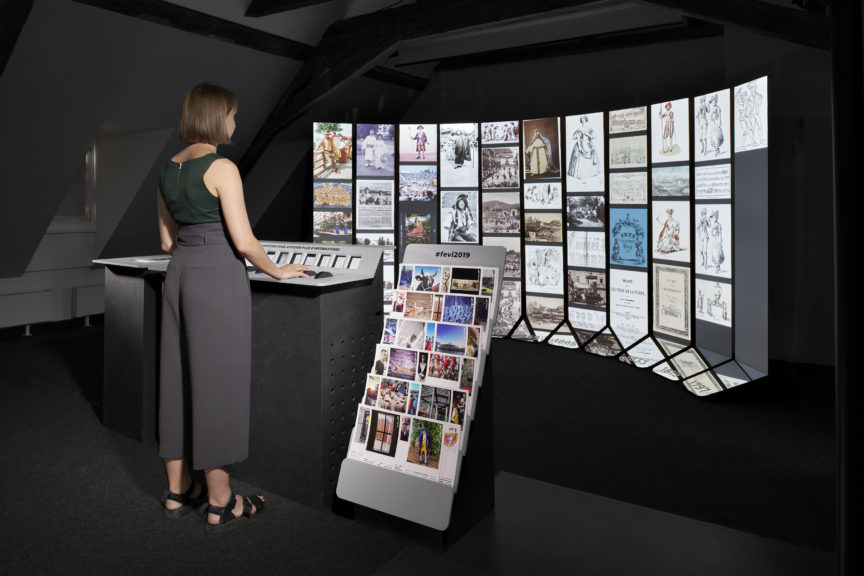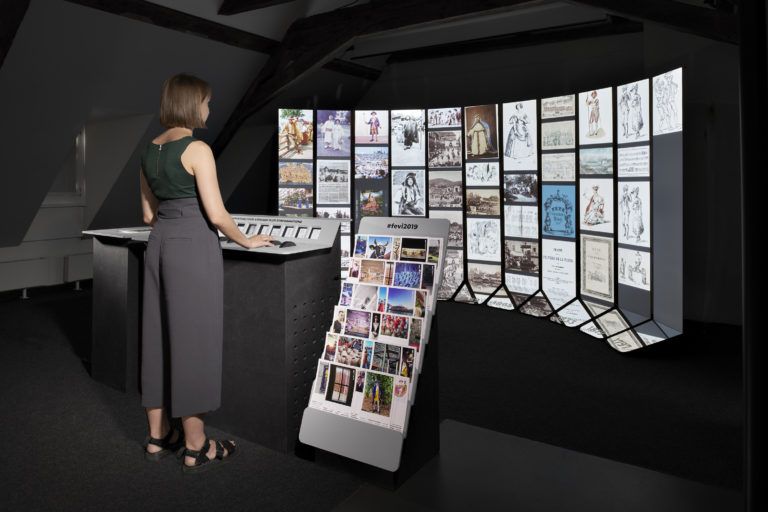Bygone Times in Real Time at the Museum für Gestaltung Zurich
Thanks to artificial intelligence, the EPFL+ECAL Lab uses today’s images posted on social networks to awaken two centuries of world heritage. Its experimental installation Bygone Times in Real Time is showcased at the Museum für Gestaltung in Zürich, in the framework of the new exhibition “Knowledge in Images – Information Design Today”. The public can discover and test it from September 20, 2019, to March 8, 2020.
On the occasion of the Fête des Vignerons that took place in Vevey this summer, the EPFL+ECAL Lab has joined forces with the Swiss Camera Museum, the Archives of the RTS Swiss broadcasting corporation, the dedicated serie by notreHistoire.ch and the Confrérie des Vignerons to offer an unparalleled exploration of the world of images. As soon as you enter, the installation challenges certainties: the images found on social networks have become actual cards. They take on a material dimension in the visitor’s hand. Placed on a lit plate, they trigger the display of a collection of old images on an immersive screen, taking viewers back to the 18th century. Good old photos witnessing bygone times have become digital. Visitors can watch them, scroll through them. A physical present, a digital past: the set-up questions our relationship to time, credibility and materiality.
The combination of these documents of very different origins is based on artificial intelligence – so-called deep learning techniques. But rather than restricting the results to users’ expectations or targeted marketing purposes, as Internet recommendation algorithms usually do, the device aims to foster discovery to build bridges between past times and real time. To counter the obscurantism of algorithms, it reveals what the machine recognises in the images and therefore how it associates them. The user can actually understand how the installation allows us to go back to the origins of the Fête in 1797.
This work continues the exploration conducted by the EPFL+ECAL Lab for a decade on the enhancement of heritage: millions of documents are now digitised and saved, but how do you bring them back to life? How can they elicit interest beyond specialist circles? This endeavour is receiving worldwide attention at the start of this summer, as four EPFL+ECAL Lab projects are operating in prestigious venues: Nina, the vehicle travelling through the audiovisual heritage of the Montreux Jazz Festival, has taken centre stage at the Festival itself; Archives in Motion reveals the spectrum of the work of Roger Tallon, designer of the TGV among others, at the Musée des Arts décoratifs in Paris; Chronogram expresses 265 years of Swiss watchmaking in New York and, as of 18 July, Temps Passé, Temps Réel is unveiled at the Camera Museum in Vevey. This series of installations open to the general public has made it possible to develop scientific and practical knowledge thanks to the new design principles established by the EPFL+ECAL Lab. These findings have now reached international recognition, as they have been also published by the magazine Leonardo-MIT Press.
As with its other projects, the EPFL+ECAL Lab will turn to experts in interface psychology to observe the impact of Temps Passé, Temps Réel. The objective is to find out how this proposal may go beyond the attraction of fun and technical performance to generate new and sustainable practices. The resulting knowledge will help to determine how to enhance the cultural and social wealth tucked away in huge man-made databases.
Project Direction
Project Management
MAS in Design Research for Digital Innovation
Interaction Design
Hélène Portier in cooperation with Lara Défayes
Software engineering
Delphine Ribes & Yves Kalberer
Hardware & firmware engineering:
Scenography
UI/UX Psychologist
Consulting Architect
Photography
EPFL+ECAL Lab / Daniela&Tonatiuh



